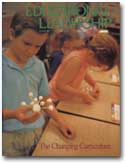Textbooks and the Students Who Can't Read Them
Textbooks and the Students Who Can't Read Them by Jean Ciborowski. Cambridge, Mass.: Brookline Books, 1992.
Textbooks are not only the dominant instructional tool, but they also often contribute to students' comprehension and learning difficulties. While the textbook controversy continues to flourish, Jean Ciborowski addresses the more immediate dilemma of how to best help students learn from textbooks.
The book provides a concise overview of research on textbooks and assists readers in becoming more aware of the qualities of good textbooks. Then the author suggests a practical approach to make textbooks more usable and understandable for students with low reading skills that can be implemented by both regular and special educators.
Textbooks outlines an approach to reading that highlights the before, during, and after reading phases and provides examples of instructional techniques that are generative and interconnected. It offers suggestions for instruction that help readers: (1) build upon and activate prior knowledge, (2) engage in a more strategic and participatory role in their learning, and (3) consolidate and extend their textbook knowledge.
Ciborowski also suggests ways in which teachers can sharpen their textbook consumer skills; she provides a checklist for evaluating textbooks that reflect the three phases of teaching, reinforce higher-order thinking, and aid in the development of comprehension and problem-solving.
Textbooks also provides teachers with user-friendly methods to help students with low reading skills become independent and self-regulating readers. Teachers seeking practical methods to assist students in problem-solving reading difficulties will find this learner-centered model applicable to their instruction.
Available from Brookline Books, P.O. Box 1046, Cambridge, MA 02238, for $21.95.
—Reviewed by Linda Behar, University of Florida, Gainesville.
The Elusive Quest
The Elusive Quest: The Struggle for Equality of Educational Opportunity by Edwin Margolis and Stanley Moses. New York: The Apex Press, 1992.
After discussing the political aspects of achieving equality in schools, the authors of The Elusive Quest conclude that this goal is “drowned out by the onslaught of politics and power.” The authors cover the role of the courts with considerable insight, noting that they have not yet definitively settled the question of whether equality is a constitutional right.
Margolis and Moses propose giving the state exclusive funding power and turning the allocation process over to what they consider to be nonpolitical bodies (such as the New York State Board of Regents). Since the New York State Board of Regents is neither nonpolitical nor unbiased, it seems, though, that this move would solve nothing.
While the book masterfully covers the financial aspects of the dilemma, the authors fail to account for some critical non-financial aspects of the problem. For example, even if poor school districts were given additional financial resources, would they utilize the money effectively? In reality, poor management accounts for much of the problems in poor school districts.
The authors display a clear understanding of the depth of change reformers are calling for—a change in policies that “go to the heart of the society, affecting the basic elements of power and privilege as they relate to family and community...and threatens and undermines basic relationships of class and status.”
The book ends on the premise that perhaps “there is not equality of educational opportunity in America—but there is an opportunity.” Anyone interested in equality of educational opportunity, particularly students of school finance, should read this book—it's a gem.
Available from the Apex Press, 777 United Nations Plaza, Suite 9A, New York, NY 10017, for $16.50.
—Reviewed by Gene Geisert, St. Johns University, New York.





